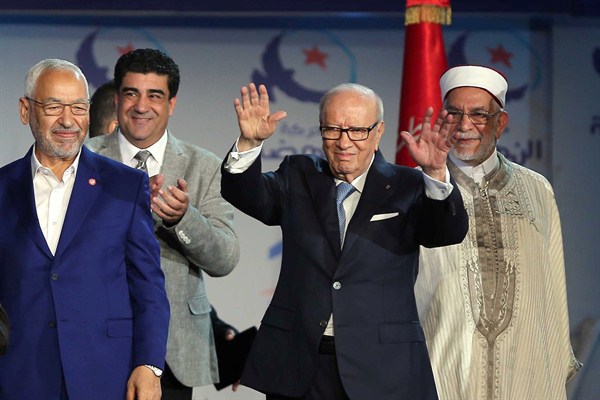One of the secondary effects of the terrible shooting in Orlando, Florida, has been to relaunch the debate on whether public officials have misidentified the terrorist threat at home by failing to call it “radical Islam” or “Islamic extremism.” At another point along the spectrum of Islamic political activism is Tunisia’s Ennahda party. Often described as a “moderate Islamist” party, its leaders recently decided to separate Ennahda’s political and religious activities, going so far as to ban party leaders from preaching in mosques or holding positions in religious associations. That raises the question of whether a party whose followers would like to see a society based on their Islamic beliefs, even if they no longer seek to legislate toward that end, is still a “moderate Islamist” party. It also raises the question of who gets to decide what to call them and their agenda, as well as Muslims who fall elsewhere on the spectrum. Sometimes the analytically precise is not the politically advisable.
In the polarized politics of America, some have pounced on President Barack Obama’s reluctance to label terrorist acts by Muslims of uncertain affiliation as “Islamic extremism.” The administration’s critics have focused their attention on this linguistic issue, suggesting that the failure to label these attacks correctly may have somehow contributed to the failure to prevent them. The argument feeds into public anxieties about Muslims and Islam, which has become one of presumptive Republican nominee Donald Trump’s main themes. Trump even wildly tweeted that the failure to use the words “radical Islam” was cause for the president to resign.
Obama reacted angrily to the focus on his choice of words, saying it has no meaningful effect on the threat itself or U.S. efforts to thwart it and calling the debate a political distraction. There is a reason why both Obama and George W. Bush before him have avoided labeling the violence and terrorism from al-Qaida and now the so-called Islamic State as “Islamic”: Both sought to avoid associating the religion of 1.6 billion people worldwide, and 2.75 million in the U.S., with these deviant acts, which are a gross abuse of the principles of Islam, not a reflection of them.

